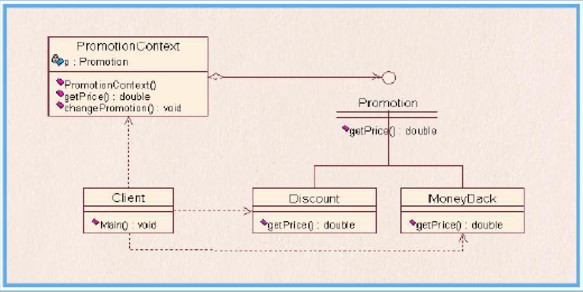您好,登录后才能下订单哦!
小编给大家分享一下C#策略模式的示例分析,相信大部分人都还不怎么了解,因此分享这篇文章给大家参考一下,希望大家阅读完这篇文章后大有收获,下面让我们一起去了解一下吧!
所谓策略其实就是做一件事情有很多很多的方法,比如说一个商场要搞促销,促销的方式有可能有很多:打折啊,满100返50啊、积分等等之类的。这种不同的促销方式在我们系统中表示就是一个一个的策略,并且策略是可以随时更换的,这个时候在设计系统时就可以使用策略模式。
商场有可能会更换或追加新的促销模式,也就是策略存在调整,也就是会更改以前的代码,为了满足开闭原则,这时就要使用抽象类和接口,这里我们偏向使用接口。在接口里面定义策略的方法,根据不同的情况编写不同的实现类,实现不同的策略,策略模式比较适用于算法经常变化的情况,比如计算工资的方式、出行方式的选择等等。

如图所示,我们先定义策略的接口(Promotion),然后在这个策略接口里定义策略的方法(GetPrice()),接着我们定义了两种具体的策略(Discount打折)和(MoneyBack返现)。
策略模式会专门有一个上下文对象(PromotionContext)专门管理策略类,并且上下文对象和策略接口之间是聚合的关系,也就是整体和部分的关系,因此在上下文对象里应该保存一个促销类型的引用,另外上下文对象里一般会有一些方便客户端调用的方法,如GetPrice()。客户端程序可以通过上下文对象得到价格,这个GetPrice()里会根据不同的策略,执行不同的策略方法。
如果客户端不想使用上下文中定义的默认的策略,也可以去修改策略类,因为上下文中有一个ChangePromotion()的方法,客户端主要使用上下文对象,如果需要修改策略,他还要依赖于具体的策略对象。
1、策略接口:
using System;
using System.Collections.Generic;
using System.Linq;
using System.Text;
using System.Threading.Tasks;
namespace 策略模式
{
/*
策略接口
*/
public interface IPromotion
{
/// <summary>
/// 根据原价和策略计算新价格
/// </summary>
/// <param name="originPrice">原价</param>
/// <returns></returns>
double GetPrice(double originPrice);
}
}2、Discount打折策略类
using System;
using System.Collections.Generic;
using System.Linq;
using System.Text;
using System.Threading.Tasks;
namespace 策略模式
{
/// <summary>
/// 打折策略类
/// </summary>
public class Discount :IPromotion
{
public double GetPrice(double originPrice)
{
Console.WriteLine("打八折:");
return originPrice * 0.8;
}
}
}3、MoneyBack返现类
using System;
using System.Collections.Generic;
using System.Linq;
using System.Text;
using System.Threading.Tasks;
namespace 策略模式
{
/*
返现策略类:满100返50的策略
*/
class MoneyBack :IPromotion
{
public double GetPrice(double originPrice)
{
Console.WriteLine("满100返50");
return originPrice - (int)originPrice / 100 * 50;
}
}
}4、策略上下文类
using System;
using System.Collections.Generic;
using System.Linq;
using System.Text;
using System.Threading.Tasks;
namespace 策略模式
{
/*
策略上下文,为客户选择合适的策略
*/
public class PromotionContext
{
private IPromotion p = null;
public PromotionContext(IPromotion p)
{
this.p = p;
}
public double GetPrice(double originPrice)
{
// 默认策略
if (this.p == null)
{
this.p = new Discount();
}
return this.p.GetPrice(originPrice);
}
/// <summary>
/// 更改策略的方法
/// </summary>
/// <param name="p"></param>
public void ChangePromotion(IPromotion p)
{
this.p = p;
}
}
}5、主程序调用
using System;
using System.Collections.Generic;
using System.Linq;
using System.Text;
using System.Threading.Tasks;
namespace 策略模式
{
class Program
{
static void Main(string[] args)
{
// 默认策略:打八折的策略
PromotionContext pc = new PromotionContext(null);
Console.WriteLine(pc.GetPrice(200)) ;
// 更改策略:满100返50的策略
pc.ChangePromotion(new MoneyBack());
Console.WriteLine(pc.GetPrice(155.9));
Console.ReadKey();
}
}
}以上是“C#策略模式的示例分析”这篇文章的所有内容,感谢各位的阅读!相信大家都有了一定的了解,希望分享的内容对大家有所帮助,如果还想学习更多知识,欢迎关注亿速云行业资讯频道!
免责声明:本站发布的内容(图片、视频和文字)以原创、转载和分享为主,文章观点不代表本网站立场,如果涉及侵权请联系站长邮箱:is@yisu.com进行举报,并提供相关证据,一经查实,将立刻删除涉嫌侵权内容。